人教新目标(Go for it)版七年级下Unit 2 What time do you go to school? Section B2(2a-2c)课件(30张ppt)
文档属性
| 名称 | 人教新目标(Go for it)版七年级下Unit 2 What time do you go to school? Section B2(2a-2c)课件(30张ppt) | 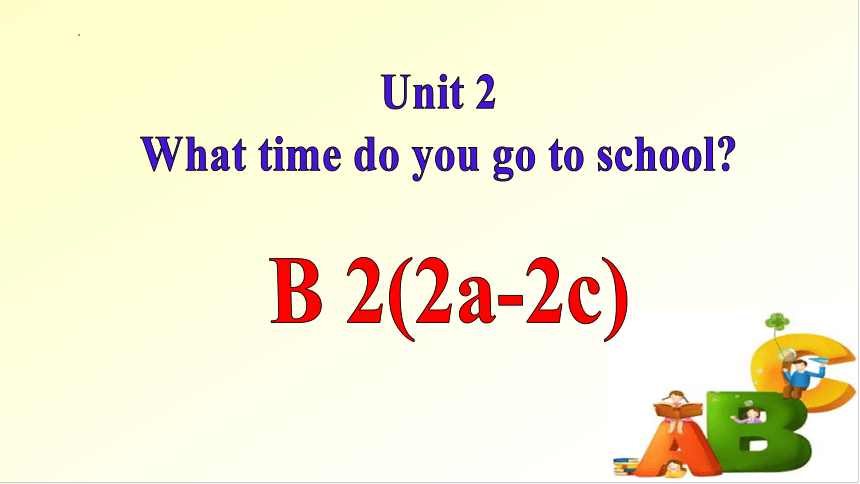 | |
| 格式 | zip | ||
| 文件大小 | 1.6MB | ||
| 资源类型 | 教案 | ||
| 版本资源 | 人教新目标(Go for it)版 | ||
| 科目 | 英语 | ||
| 更新时间 | 2022-03-05 20:07:57 | ||
图片预览

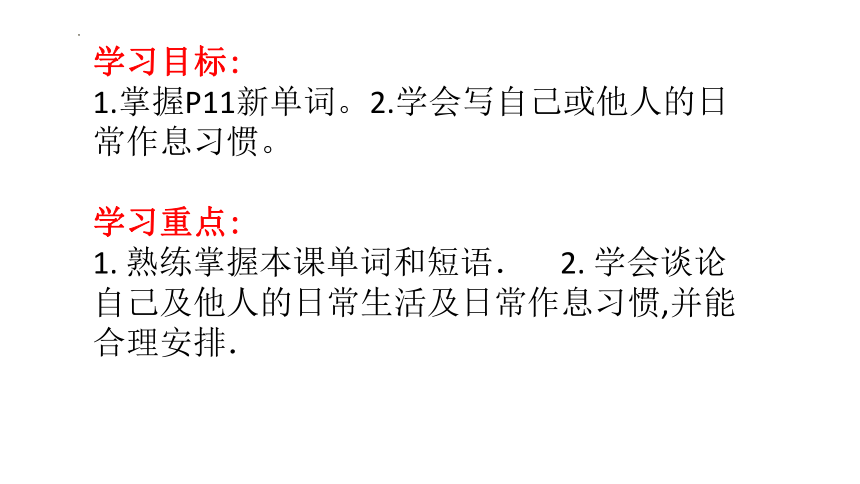
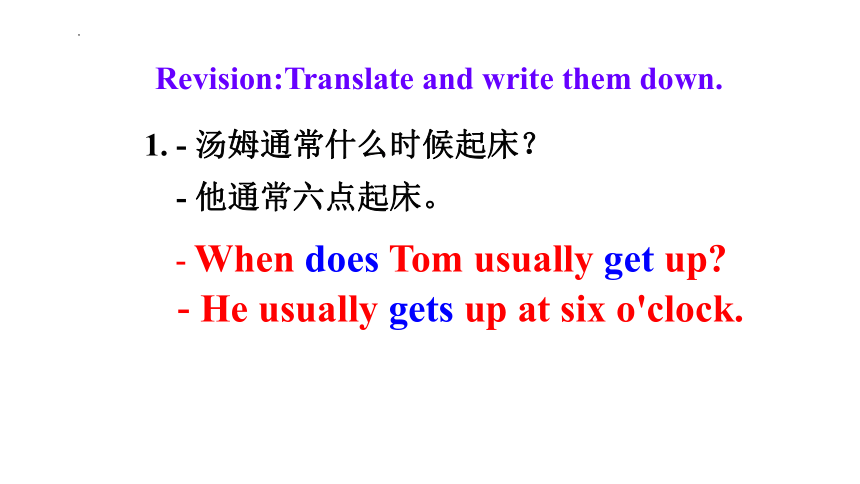
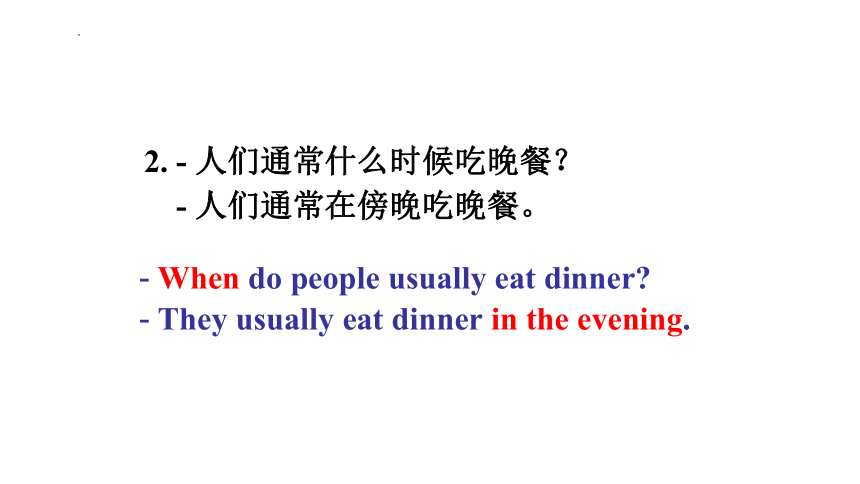
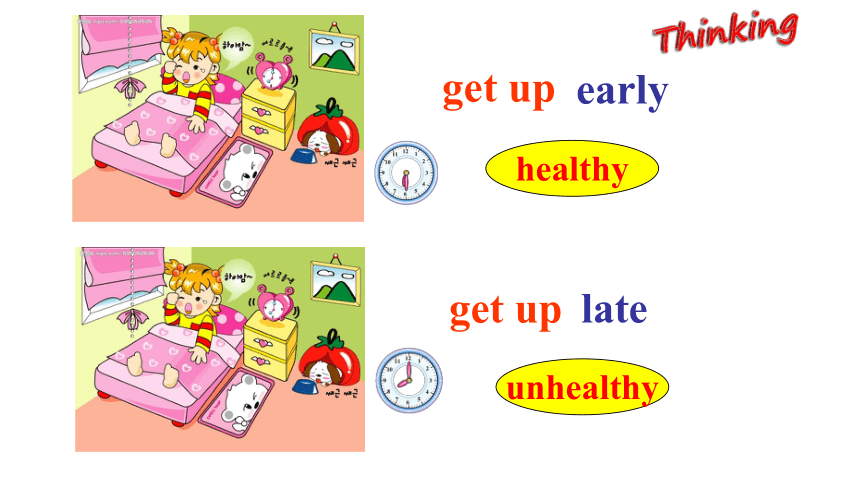
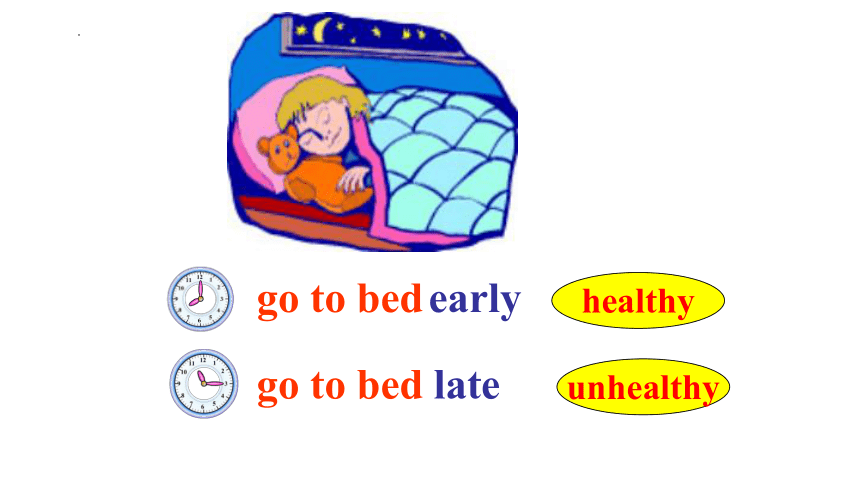
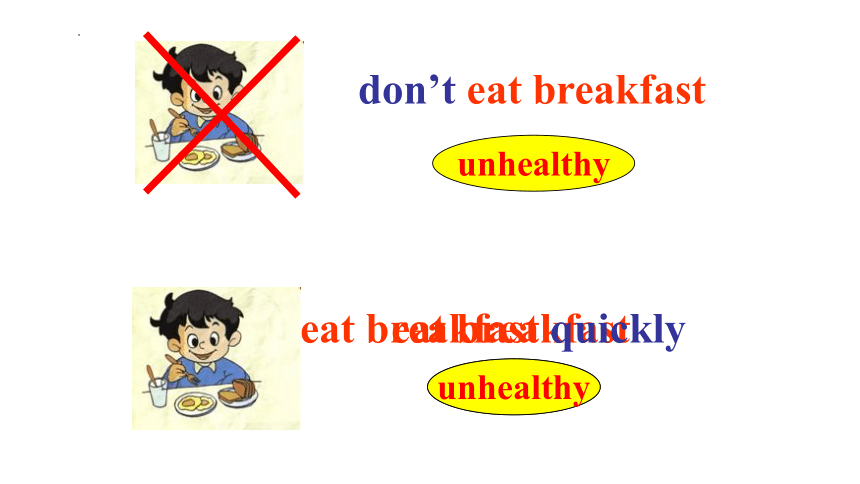
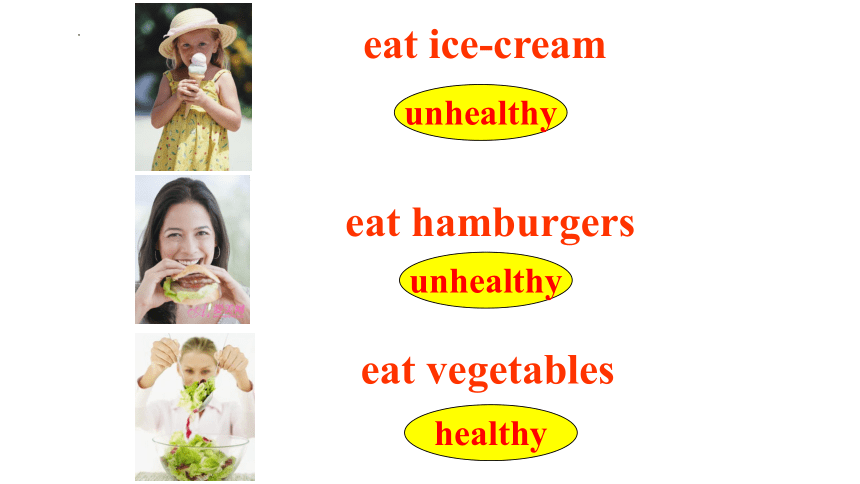
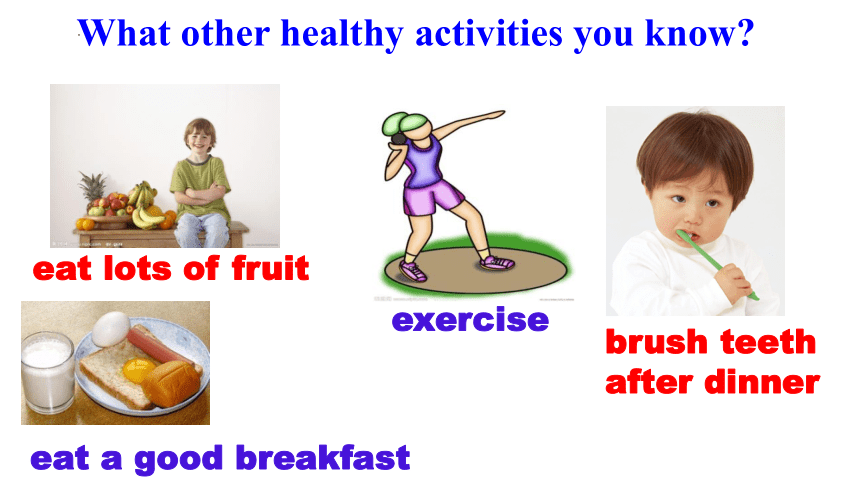
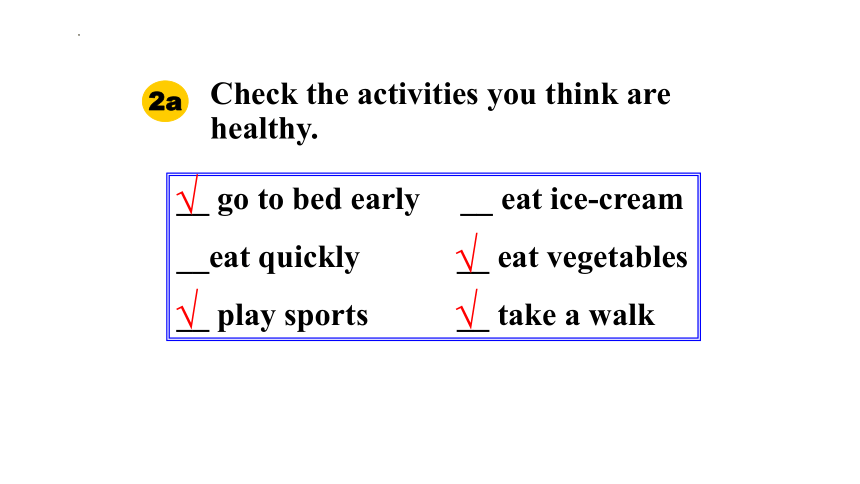
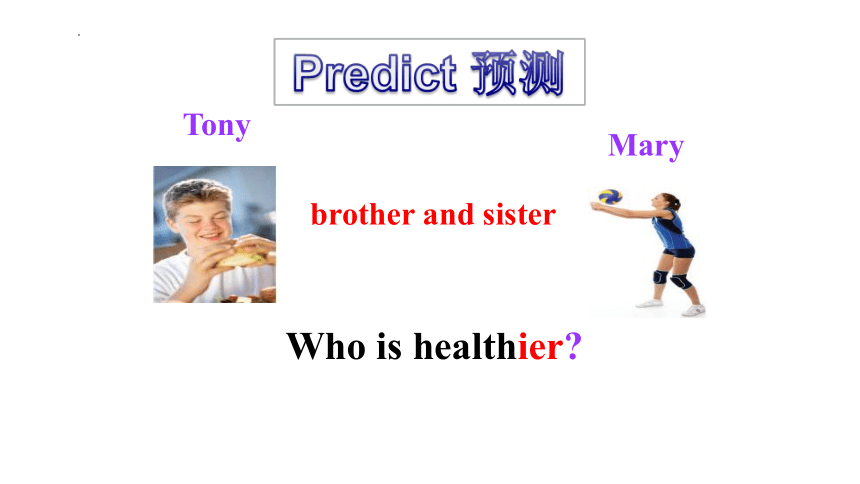
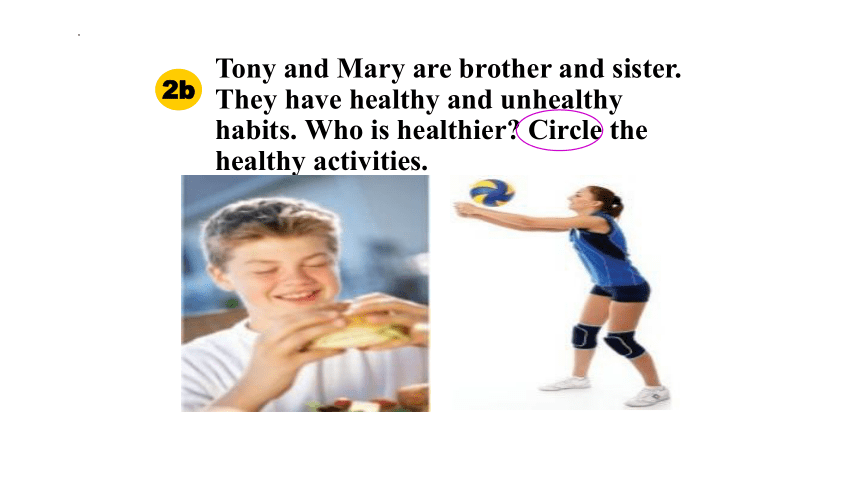
文档简介
(共30张PPT)
Unit 2
What time do you go to school
B 2(2a-2c)
学习目标:
1.掌握P11新单词。2.学会写自己或他人的日常作息习惯。
学习重点:
1. 熟练掌握本课单词和短语. 2. 学会谈论自己及他人的日常生活及日常作息习惯,并能合理安排.
Revision:Translate and write them down.
1. - 汤姆通常什么时候起床?
- 他通常六点起床。
When does Tom usually get up
He usually gets up at six o'clock.
2. - 人们通常什么时候吃晚餐?
- 人们通常在傍晚吃晚餐。
When do people usually eat dinner
They usually eat dinner in the evening.
get up
early
late
healthy
unhealthy
get up
Thinking
go to bed
early
late
healthy
unhealthy
go to bed
eat breakfast
don’t eat breakfast
eat breakfast quickly
healthy
unhealthy
unhealthy
eat ice-cream
healthy
unhealthy
eat hamburgers
eat vegetables
unhealthy
exercise
eat lots of fruit
What other healthy activities you know
eat a good breakfast
brush teeth after dinner
2a
Check the activities you think are healthy.
__ go to bed early __ eat ice-cream
__eat quickly __ eat vegetables
__ play sports __ take a walk
√
√
√
√
Tony
Mary
brother and sister
Who is healthier
2b
Tony and Mary are brother and sister. They have healthy and unhealthy habits. Who is healthier Circle the healthy activities.
Section B-2b.mp3
2c Write down the unhealthy habits of each person. Then think of healthy activities for them.
____________________
____________________
____________________
____________________
Unhealthy habits
Tony:
gets up late
eats breakfast quickly
eats hamburgers
goes to bed late
____________________
____________________
eats ice-cream after dinner
Mary:
2c Write down the unhealthy habits of each person. Then think of healthy activities for them.
Healthy activities
________________________
________________________
________________________
________________________
Tony:
gets up early
eats a good breakfast
eats fruit and vegetables
goes to bed early
________________________________________
eats some fruit
after dinner
Mary:
1. 起得早____________________
2. 很多时间_______________
3. 吃得快_________________
4. 半小时___________________
5. 到家_____________________
6. 先做家庭作业_______________________________
7. 要么看电视要么玩电脑游戏
___________________________________________________
8. 吃一顿丰盛的早餐__________________________
9. 吃许多水果和蔬菜_______________________________
10. 对她没有好处________________
11. 尝起来不错______________
试译下面的短语:
get up early
much time have much time to do sth
eat quickly
half an hour
get home
do homework first
either watch TV or play computer games
eat a good breakfast
eat lots of fruit and vegetables
It's not good for her.
taste good
精讲点拨:
1. He doesn’t have lots of books.
2.We have lots of work to do.
3. I don’t have much time .
4 . There are many apples on the desk.
总结:lots of 与many, much的用法。
这三个词都有“许多;大量”之意,但用法不同。
1) ______________后面可以跟可数名词也可以跟不可数名词。
2) ____________与可数名词复数形式连用。
3) ____________表示数量时,只能修饰不可数名词。
lots of
many
much
2. run v. 跑;奔
My sister likes _______ in the morning.
(跑步)
拓展: runner n. 参加跑步的选手
3. walk n. & v. 行走;步行
e.g. Our headteacher always ______ to
school every morning.
拓展: take a walk go for a walk
e.g. I want ____________ with you. (散步)
Let’s _____________. (去散步)
running
walks
to take a walk
go for a walk
4. clean v. 打扫;弄干净 adj. 干净的
e.g. Does he often ______ his mother’s
room
We must keep our environment ______.
拓展: cleaner n. 清洁工
do some/the cleaning
clean
clean
5. In the evening, I either watch TV or play computer games.
either conj. 或者
adv. 也(用在否定句末)
either… or… “或者……或者……;
要么…….要么……; 不是……就是…… ”
连接两个独立的词、短语或句子。
当either…or…连接两个名词作主语时,谓语动词的时态和数应与最近的一个相匹配(就近一致) 。
e.g. Either you or he ___ right.
He is good at _____singing ____ dancing.(要么...要么)
You needn’t go to the shop ______. (也)
adv. 也(用在否定句末)
is
either
or
either
一、用所给词适当形式填空:
1. He usually eats breakfast ____________(quick).
2. The chicken tastes ___________(well).
3. My sister has a ____________(health) life .
4. There are lots of ___________(tomato) in the bag .
二、选择:
1. I usually have no time _________ breakfast .
A. to B. for C. at D.in
2. He ________ watches TV or does his homework .
A. either B. neither C. don’t D. both
3. I don’t have __________homework now.
A. a lots of B. a lot C. lot of D. lots of
4. We don’t have ________ milk.
A. many B. much C. some D. lot of
5. Ice-cream isn’t good _______ us.
A. for B. in C. at D. with
quickly
good
healthy
tomatoes
B
A
D
B
A
Thank you,everyone!Bye-Bye
Read Para1 and fill in the blanks.
Time Tony’s Activities
At eight __________
At eight thirty ________________
At noon ________________
After school _____________________________________________
In the evening _______________________
At ten thirty _______________________
gets up
goes to school
eats hamburgers
plays basketball for half an hour
does his homework
watches TV or plays computer games
brushes teeth and goes to bed
Time Mary’s Activities
___________ gets up
takes a shower and eats a good breakfast
___________ goes to school
At twelve _________________________
After lunch
After dinner In the evening
At nine thirty
At six thirty
At eight thirty
eat lots of fruit and vegetables
plays volleyball
eats ice-cream
does her homework, swims or takes a walk
goes to bed
Read Para2 and fill in the blanks.
三、根据汉语提示完成句子。
1. 我没有时间吃早餐,因此我通常吃得很快。
I don’t have _____ ____ for breakfast, so I usually ___ ____ ______.
2. 他在晚上或者看电视或者玩电脑游
戏。
He ______ watches TV __ plays computer games __ the ________.
much time
eat very quickly
either or
in evening
3. 午餐,她吃很多的水果和蔬菜。
For _____, she ____ ____ ___ fruit and vegetables.
4. 冰淇淋尝起来很好,但对她的健康不好。
Ice-cream ____ _____, but it’s not _____ ____ her.
lunch eats lots of
tastes good
good for
Unit 2
What time do you go to school
B 2(2a-2c)
学习目标:
1.掌握P11新单词。2.学会写自己或他人的日常作息习惯。
学习重点:
1. 熟练掌握本课单词和短语. 2. 学会谈论自己及他人的日常生活及日常作息习惯,并能合理安排.
Revision:Translate and write them down.
1. - 汤姆通常什么时候起床?
- 他通常六点起床。
When does Tom usually get up
He usually gets up at six o'clock.
2. - 人们通常什么时候吃晚餐?
- 人们通常在傍晚吃晚餐。
When do people usually eat dinner
They usually eat dinner in the evening.
get up
early
late
healthy
unhealthy
get up
Thinking
go to bed
early
late
healthy
unhealthy
go to bed
eat breakfast
don’t eat breakfast
eat breakfast quickly
healthy
unhealthy
unhealthy
eat ice-cream
healthy
unhealthy
eat hamburgers
eat vegetables
unhealthy
exercise
eat lots of fruit
What other healthy activities you know
eat a good breakfast
brush teeth after dinner
2a
Check the activities you think are healthy.
__ go to bed early __ eat ice-cream
__eat quickly __ eat vegetables
__ play sports __ take a walk
√
√
√
√
Tony
Mary
brother and sister
Who is healthier
2b
Tony and Mary are brother and sister. They have healthy and unhealthy habits. Who is healthier Circle the healthy activities.
Section B-2b.mp3
2c Write down the unhealthy habits of each person. Then think of healthy activities for them.
____________________
____________________
____________________
____________________
Unhealthy habits
Tony:
gets up late
eats breakfast quickly
eats hamburgers
goes to bed late
____________________
____________________
eats ice-cream after dinner
Mary:
2c Write down the unhealthy habits of each person. Then think of healthy activities for them.
Healthy activities
________________________
________________________
________________________
________________________
Tony:
gets up early
eats a good breakfast
eats fruit and vegetables
goes to bed early
________________________________________
eats some fruit
after dinner
Mary:
1. 起得早____________________
2. 很多时间_______________
3. 吃得快_________________
4. 半小时___________________
5. 到家_____________________
6. 先做家庭作业_______________________________
7. 要么看电视要么玩电脑游戏
___________________________________________________
8. 吃一顿丰盛的早餐__________________________
9. 吃许多水果和蔬菜_______________________________
10. 对她没有好处________________
11. 尝起来不错______________
试译下面的短语:
get up early
much time have much time to do sth
eat quickly
half an hour
get home
do homework first
either watch TV or play computer games
eat a good breakfast
eat lots of fruit and vegetables
It's not good for her.
taste good
精讲点拨:
1. He doesn’t have lots of books.
2.We have lots of work to do.
3. I don’t have much time .
4 . There are many apples on the desk.
总结:lots of 与many, much的用法。
这三个词都有“许多;大量”之意,但用法不同。
1) ______________后面可以跟可数名词也可以跟不可数名词。
2) ____________与可数名词复数形式连用。
3) ____________表示数量时,只能修饰不可数名词。
lots of
many
much
2. run v. 跑;奔
My sister likes _______ in the morning.
(跑步)
拓展: runner n. 参加跑步的选手
3. walk n. & v. 行走;步行
e.g. Our headteacher always ______ to
school every morning.
拓展: take a walk go for a walk
e.g. I want ____________ with you. (散步)
Let’s _____________. (去散步)
running
walks
to take a walk
go for a walk
4. clean v. 打扫;弄干净 adj. 干净的
e.g. Does he often ______ his mother’s
room
We must keep our environment ______.
拓展: cleaner n. 清洁工
do some/the cleaning
clean
clean
5. In the evening, I either watch TV or play computer games.
either conj. 或者
adv. 也(用在否定句末)
either… or… “或者……或者……;
要么…….要么……; 不是……就是…… ”
连接两个独立的词、短语或句子。
当either…or…连接两个名词作主语时,谓语动词的时态和数应与最近的一个相匹配(就近一致) 。
e.g. Either you or he ___ right.
He is good at _____singing ____ dancing.(要么...要么)
You needn’t go to the shop ______. (也)
adv. 也(用在否定句末)
is
either
or
either
一、用所给词适当形式填空:
1. He usually eats breakfast ____________(quick).
2. The chicken tastes ___________(well).
3. My sister has a ____________(health) life .
4. There are lots of ___________(tomato) in the bag .
二、选择:
1. I usually have no time _________ breakfast .
A. to B. for C. at D.in
2. He ________ watches TV or does his homework .
A. either B. neither C. don’t D. both
3. I don’t have __________homework now.
A. a lots of B. a lot C. lot of D. lots of
4. We don’t have ________ milk.
A. many B. much C. some D. lot of
5. Ice-cream isn’t good _______ us.
A. for B. in C. at D. with
quickly
good
healthy
tomatoes
B
A
D
B
A
Thank you,everyone!Bye-Bye
Read Para1 and fill in the blanks.
Time Tony’s Activities
At eight __________
At eight thirty ________________
At noon ________________
After school _____________________________________________
In the evening _______________________
At ten thirty _______________________
gets up
goes to school
eats hamburgers
plays basketball for half an hour
does his homework
watches TV or plays computer games
brushes teeth and goes to bed
Time Mary’s Activities
___________ gets up
takes a shower and eats a good breakfast
___________ goes to school
At twelve _________________________
After lunch
After dinner In the evening
At nine thirty
At six thirty
At eight thirty
eat lots of fruit and vegetables
plays volleyball
eats ice-cream
does her homework, swims or takes a walk
goes to bed
Read Para2 and fill in the blanks.
三、根据汉语提示完成句子。
1. 我没有时间吃早餐,因此我通常吃得很快。
I don’t have _____ ____ for breakfast, so I usually ___ ____ ______.
2. 他在晚上或者看电视或者玩电脑游
戏。
He ______ watches TV __ plays computer games __ the ________.
much time
eat very quickly
either or
in evening
3. 午餐,她吃很多的水果和蔬菜。
For _____, she ____ ____ ___ fruit and vegetables.
4. 冰淇淋尝起来很好,但对她的健康不好。
Ice-cream ____ _____, but it’s not _____ ____ her.
lunch eats lots of
tastes good
good for
同课章节目录
- Unit 1 Can you play the guitar?
- Section A
- Section B
- Unit 2 What time do you go to school?
- Section A
- Section B
- Unit 3 How do you get to school?
- Section A
- Section B
- Unit 4 Don't eat in class.
- Section A
- Section B
- Unit 5 Why do you like pandas?
- Section A
- Section B
- Unit 6 I'm watching TV.
- Section A
- Section B
- Review of Units 1-6
- Unit 7 It's raining!
- Section A
- Section B
- Unit 8 Is there a post office near here?
- Section A
- Section B
- Unit 9 What does he look like?
- Section A
- Section B
- Unit 10 I'd like some noodles.
- Section A
- Section B
- Unit 11 How was your school trip?
- Section A
- Section B
- Unit 12 What did you do last weekend?
- Section A
- Section B
